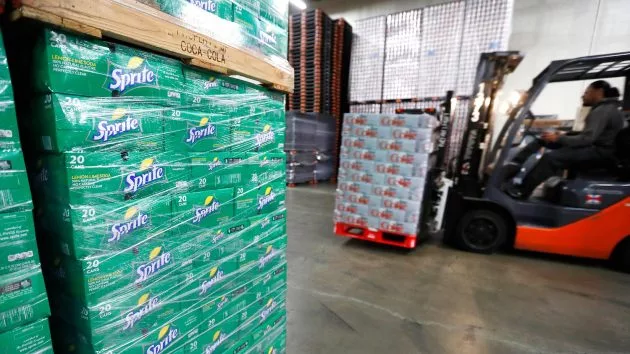
(NEW YORK) — Refrigerators, beers and bicycles stand at risk of higher prices as a result of tariffs on steel and aluminum announced by President Donald Trump this week, experts told ABC News.
The tariffs, which take effect next month, slap a 25% tax on all foreign steel and aluminum, repeating a policy Trump initiated during his first term in office.
Trade experts told ABC News the tariffs will likely raise prices for some goods made out of the two metals, since importers typically pass along a share of the cost of those higher taxes to retailers and, in turn, down the line to consumers.
“This will feed through the economy,” Kyle Handley, a professor of economics at the University of California, San Diego, told ABC News. Higher prices could manifest in as little as three months or as long as a year, Handley added.
In response to ABC News’ request for comment, the White House said the policy would boost economic performance.
“In his first administration, President Trump instituted an America First economic agenda of tariffs, tax cuts, deregulation and an unleashing of American energy that resulted in historic job, wage and investment growth with no inflation. In his second administration, President Trump will again use tariffs to level the playing field and usher in a new era of growth and prosperity for American industry and workers,” White House spokesperson Kush Desai said.
Here are the prices that may increase as a result of tariffs on steel and aluminum:
Cars and trucks
Steel is the top material by weight in a car, accounting for about 60% of its weight, according to the American Iron and Steel Institute.
Once steel imports face stiff taxes, experts forecast the price of steel paid by U.S. manufacturers will rise, meaning higher input costs for carmakers. Those companies, they added, are likely to hike prices for consumers as a means of offsetting some of those costs.
“There’s a lot of metal in a Ford truck,” Handley said. “If it’s more expensive, they’ll have to charge more for the car.”
Ford declined to respond to ABC News’ request for comment. Speaking on Tuesday at the Wolfe Research conference, an investor gathering, Ford CEO Jim Farley said potential tariffs on steel and aluminum are causing “cost and chaos,” according to a transcript of the event shared by Ford.
Bill Hanvey, president and CEO of Auto Care Association, a trade group representing thousands of firms across the vehicle supply chain, criticized the steel tariffs.
“Many specialty steel products used in our industry are not readily available from domestic sources, making access to global supply chains essential,” Hanvey said in a statement.
Soda and beer
Aluminum tariffs risk higher prices for beverages packaged in aluminum cans, such as beer and soft drinks, some experts said.
The previous set of tariffs on aluminum cost the U.S. beverage industry $1.7 billion between 2018 and 2022, according to the Beer Institute, an industry trade group.
“Paying a tariff-laden price on all aluminum drives up the cost of doing business and makes consumer goods more expensive,” the Beer Institute said in 2022.
In response to the tariffs imposed by Trump this week, the Illinois Craft Brewers Guild warned on X: “Our small brewery owners and customers will pay the price.”
Some soda companies may also feel the pinch. Speaking on an earnings call on Tuesday, Coca-Cola CEO James Quincey said the company may focus on a different packaging material if aluminum prices rise.
Home appliances
Major home appliances — such as refrigerators and washing machines — rely in part on steel, making them vulnerable to potential price increases, Jason Miller, a professor of supply chain management at Michigan State University, told ABC News.
“You would certainly expect to see those goods get a little bit more expensive,” Miller said.
In the aftermath of steel and aluminum tariffs during Trump’s first term, major appliances showed price increases of between 5% and 10% between June 2018 and April 2019, Miller added, citing a monthly government data release. Those price hikes far outpaced an overall inflation rate of around 2%.
Though prices for major appliances started to decline in the latter part of 2019, Miller noted, forecasting at the very least a halt in the price drops.
Bicycles
Steel and aluminum make up a key component of bicycles, raising the likelihood of price increases, Handley said.
“Bicycles will definitely be more expensive,” Handley said, pointing to the aluminum used for bicycle frames and components. In some cases, he added, those raw materials depend on steel.
Last month, trade organization People For Bikes expressed concern about 25% tariffs issued for Canadian and Mexican goods, as well as a 10% tariff on Chinese goods. Within days, Trump paused the tariffs on Mexico and Canada for one month, though they remain on the table.
“As a result of the new administration’s policies, the international trade landscape has become, and will remain, increasingly turbulent,” Matt Moore, policy counsel at People For Bikes, wrote in a blog post.
Copyright © 2025, ABC Audio. All rights reserved.








